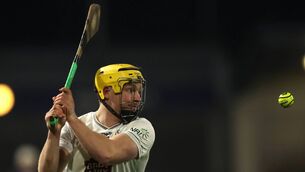The Supporter: New rules changes chance to take our game back

Jim Gavin Chairperson of the Review Committee Photo: INPHO/Bryan Keane.
I remember a time when hand-passed goals were allowed in gaelic football. My memories of the 1970’s involve the likes of John Egan, Tony Hanahoe and Tommy Carew scoring for fun without giving the boot a second thought.
I also remember when it was two points for a win in soccer and four points for a try in rugby.
The most impactful rule change in any sport in my lifetime, though, was the banning of soccer goalkeepers from picking up a back-pass.
When that came about in 1992 the game was as dull as ditchwater and tactically bankrupt.
Ireland remembers the 1990 World Cup fondly but for most of the watching world it was a bore.
Take a look at a clip of Ireland’s equaliser against Holland. Packie Bonner picks up a ball in his area and does that little jig of his before launching an Exocet towards the Dutch penalty area.
It’s too long for Tony Cascarino but defender Van Aerle completely miscues his clearance, sending it spinning back to their ‘keeper Van Breukelen.
It should be an easy collection for the ‘keeper but he spills it and Ireland’s other beanpole striker Niall Quinn is on hand to stab it home.
The beautiful game? Not so much.
Defending and goalkeeping were child’s play. Once the ball reached the defensive third it was shuffled back to the ‘keeper who scooped it up and wasted a good thirty seconds before launching it as far away as possible.
When the rule was changed such that ‘keepers had to play it with their feet, it was career-ending for those number ones, Bonner included, who hadn’t the ball skills to cope.
In England, Leeds United under the pragmatic Yorkshireman Howard Wilkinson, had just won the ’91-’92 league title with John Lukic their custodian between the posts.
Like Bonner, Lukic hated the ball on the deck, and it was no coincidence that his team plummeted to seventeenth the following season.
It was a long and winding progression from that inflection point to today’s ‘sweeper-keepers’ but it’s a change that clearly revolutionised how the game was played worldwide with the ball on the increasingly well-manicured grass most of the time.
The impact of three-points for a win or rugby’s five-point try are probably less-well understood, although the bonus point system for four tries in rugby is almost universally deemed a success.
Gaelic football has a chequered history of rule changes, and the likes of the black card and advanced mark have not been particularly well received.
I’m looking forward to dipping my toes into Jim Gavin’s “Sandbox” as he road tests his committee’s proposed new rules, with provincial trial games taking place the weekend after next. I can’t wait, honestly.
Football is badly in need of radical change. If you don’t believe that you are either under-25 and grew up with the monstrosity that is played nowadays or you’re a paid-up member of the coaches union.
The All Ireland final was a prime example of a modern game unworthy of the build-up and occasion. A bore.
Any changes need to support the goals of reduced lateral play, limiting packed defences, prioritising kicking over handpassing and bringing more one-to-one challenges into play.
Gavin’s FRC have put a huge amount of work into the proposed changes they’re bringing forward for trial in the provincial series the weekend after next.
I do wonder whether there might be too many new rules in there to properly ascertain which ones are causing which outcome. I think the “3-up, 3-back” rule is the most interesting proposal and apart from limiting the ability to pack defences it has the added benefit of giving a team a chance to quickly send the ball up to a forward in space once they regain possession in defence. With a kick-pass.
Imagine a Ben McCormack or a Daniel Flynn up front in such a scenario. The opportunities created by a well-directed forward pass to either of those two would be interesting to say the least.
The goalkeeper is enemy number one in the proposals, not through any desire to “put them back in their box” but because every “innovation” coaches and netminders have come up with have helped re-enforce the risk-averse possession game that is so boring for supporters.
‘Keepers will hate the banning of the short kick out and the back-pass to them. But both changes can re-invigorate the game in the same way the ban on the back-pass in soccer revolutionised how that game was played.
I see no great benefit in the one-v-one throw in to start a game. A minor tweak that seems out of place with the other proposals.
The “solo and go” is a good suggestion, though. Anything that creates a bit of chaos and mitigates against teams funnelling into massed defence while encouraging individual skill is to be welcomed.
The tweak to the advanced mark is also a positive although I am not sure we need the mark at all if the other proposals come in.
The final core proposal is that a goal would count as four points, and a ‘point’ scored from outside a 40-metre arc would count as two points.
In theory the increased value of a goal will encourage more attacking play, but will it not also prompt defences to double-down on cynical play to keep goals out at all costs?
I’m not sure this proposal changes anything in terms of how the game is played and I expect its impact to be marginal at best.
It will be interesting too to see how many two-pointers are scored from outside the new ‘arc’ in the sandbox games. Players have been so discouraged from taking on those low-percentage shots that it’s going to be difficult for them to change their mindset and take a chance on a shot from range.
It’s all worth a go, though. Something needed to be done. We might just get our game back.
Cill Dara Abú





